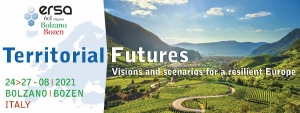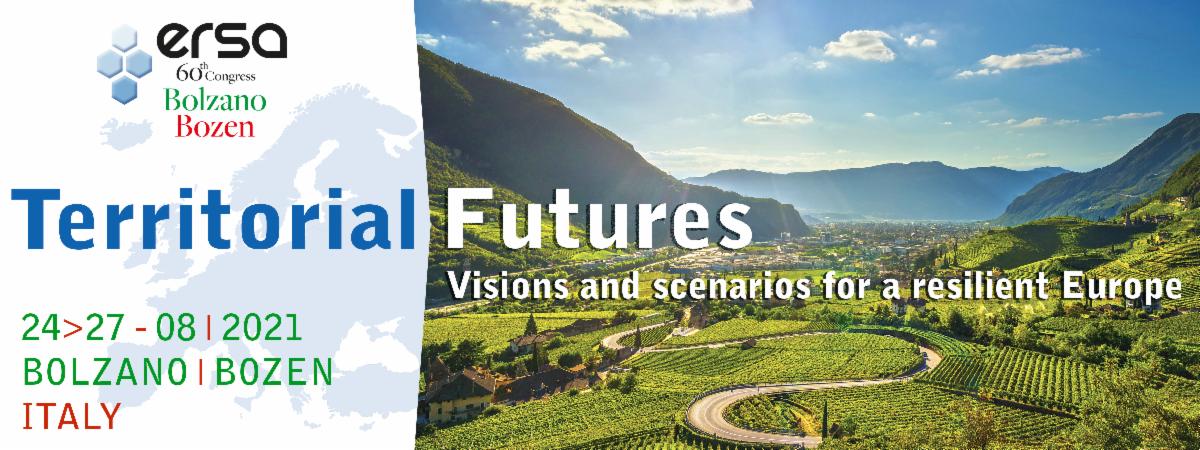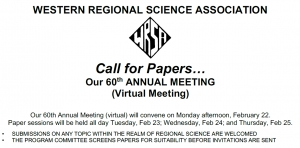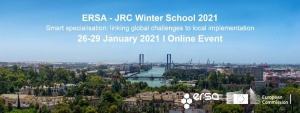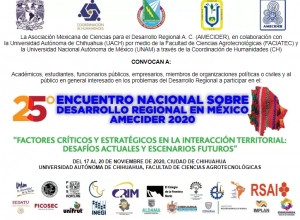Archives
Elisabete Martins
Geoffrey Hewings
 “…I THINK YOU should you should try to acquire two books, Location and the Space Economy and Methods of Regional Analysis both by Walter Isard. I think you might find the new field of regional science of interest.” These remarks were made at the end of a warm letter from Professor Richard B. Andrews, the journal editor of Land Economics and a professor at the University of Wisconsin. At the time, I was an undergraduate at the University of Birmingham. The courses that I was taking were so boring that I ended up spending a great deal of time in the library where I came across a new addition to the economics’ journals collection– Land Economics. In the first issue they had obtained, there was the fifth in a series of articles on the economic base model by Andrews; I wrote to him about my interest in regional models and asked whether he could send me copies of the first four articles in the series which he did along with this wonderful letter. I bought the recommended books (well over $100 in today’s currency and a fortune in terms of my purchasing capacity in 1964). After some research, I decided to apply for a PhD at the University of Washington where Douglass North and Charlie Tiebout were in economics and several analytical folks in geography. During my first semester, Morgan Thomas (at one time editor of the Papers & Proceedings of RSA and a fellow Welshman) approached me “Geoffrey, I want you to give me $5 for membership in the Regional ScienceAssociation.” How was I to say no and so the first journal arrived in 1965.Tiebout ended up as one of my advisors but, sadly, died while I was starting my dissertation. If my classes had interested me at Birmingham and if Andrews had not responded, I may not have found regional science!
“…I THINK YOU should you should try to acquire two books, Location and the Space Economy and Methods of Regional Analysis both by Walter Isard. I think you might find the new field of regional science of interest.” These remarks were made at the end of a warm letter from Professor Richard B. Andrews, the journal editor of Land Economics and a professor at the University of Wisconsin. At the time, I was an undergraduate at the University of Birmingham. The courses that I was taking were so boring that I ended up spending a great deal of time in the library where I came across a new addition to the economics’ journals collection– Land Economics. In the first issue they had obtained, there was the fifth in a series of articles on the economic base model by Andrews; I wrote to him about my interest in regional models and asked whether he could send me copies of the first four articles in the series which he did along with this wonderful letter. I bought the recommended books (well over $100 in today’s currency and a fortune in terms of my purchasing capacity in 1964). After some research, I decided to apply for a PhD at the University of Washington where Douglass North and Charlie Tiebout were in economics and several analytical folks in geography. During my first semester, Morgan Thomas (at one time editor of the Papers & Proceedings of RSA and a fellow Welshman) approached me “Geoffrey, I want you to give me $5 for membership in the Regional ScienceAssociation.” How was I to say no and so the first journal arrived in 1965.Tiebout ended up as one of my advisors but, sadly, died while I was starting my dissertation. If my classes had interested me at Birmingham and if Andrews had not responded, I may not have found regional science!
Tiebout’s class at the University of Washington was entitled Regional Income Analysis and it was here that I was introduced to the new field of regional economics and especially to input-output models. Tiebout’s charismatic approach to teaching, his wicked sense of humor and his demonstrable enthusiasm for his research quickly struck a resonant chord. During the class, he asked us to review drafts of chapters of Nourse’s (1968) book on Regional Economics, adopting an innovation of having students react to a proposed new textbook (Tiebout used the honorarium he received for reviewing the book to host a party at his house as a way of rewarding our efforts). From Seattle, I spent two years as a Post-Doc at the University of Kent at Canterbury before accepting a position at the University of Toronto. Thereafter, in 1974, I came to the University of Illinois at Urbana-Champaign. I expected to stay 3-5 years, but it has now been 46! H.F. (Bill) Williamson, Lewis Hopkins and Andrew Isserman provided the foundation for a community of scholars interested in regional science, joined later by Michael Romanos, T. John Kim, James Huff, Arthur Getis, David Boyce, Frank Southworth, Jan Brueckner, Kieran Donaghy, Bruce Newbold, Marilyn Brown and Luc Anselin among others.
In the full spirit of regional science, these scholars were spread across the departments of agricultural and consumer economics, economics, urban and regional planning, civil engineering and geography. The seminar series and the high frequency of international visitors made for a vibrant intellectual atmosphere; by this time, our sons had moved out of the community and my wife, Adrianna, with her newly acquired PhD had accepted a position with USDA in Washington, leaving me in a house with 4 bedrooms! To save money, visitors were housed there at such a high frequency that John Kim referred to it as the Regional Science Hotel!
In the mid 1980s, Philip Israilevich (PhD Regional Science, Pennsylvania) and I began a series of conversations at regional science meetings; he was in the process of moving from the Cleveland to the Chicago Federal Reserve Bank and given our shared interests in regional economic modeling, we thought it might be attractive to create a joint research center between the University of Illinois and the Chicago Fed. Much to our surprise, both institutions were supportive and in January 1989, the Regional Economics Applications Laboratory (REAL) was created. We started with one post-doc, Ramamohan Mahidhara, and two PhD students, Eduardo Martins and Ricardo Gazel with offices at the Chicago Fed and one on the Urbana campus. Eighteen months later, the Chicago Region Econometric Input-output Model (CREIM) was completed, with considerable assistance from Richard Conway, and we began to obtain grants and contracts to perform a variety of economic impact and forecasting analyses. CREIM provided the bases for a continuing series of research papers including the innovation of extracting endogenous time-series input-output coefficients, exploring alternative measures of structural change and developing the concept of field of influence with Michael Sonis. Sonis, based in Israel, was a frequent visitor to REAL and commented on more than one occasion that it was his intellectual home. The initial focus on regional input-output models quickly broadened to include spatial econometric work, explorations of business cycles, convergence, income distributions, housing and migration.
Within a few years, we had a suite of offices on the Urbana campus that were connected to form one large space. One of the innovations of REAL was that it was modeled on the environment which my wife had experienced – with students and professors sharing a lab space in which there was a great deal of interaction. Soon, we found that we were attracting international visitors and students in increasing numbers – but all were housed in this communal space. As a result, a great deal of collaborative work ensued often involving students and visiting professors from different countries and different disciplinary backgrounds – regional science in action! In the 30+ years of REAL’s existence, somewhere between 400-500 visitors have spent at least 3 months in REAL, many returning for second and third stays. Clones of REAL have been created in Chile, Brazil, Spain, UK, China and, hopefully, soon in Mexico; fostering an atmosphere in which personal and professional relationships can be mutually developed seems to have been an attractive and sustaining feature.
For me, these developments have been a source of great pleasure; my peripatetic nature (a genetic trait inherited from one of my grandparents who was an Irish traveller) has enabled me to stay in touch with so many of the participants over the years. Watching their careers evolve has been incredibly rewarding. Hence, I am indebted to Richard Andrews, Morgan Thomas, Charlie Tiebout, Philip Israilevich and, of course, Walter Isard who, at critical junctures provided a gentle push and amazing support. I have always tried to respond to inquiries or requests for papers in a timely way since I recognize how important the response from Andrews was to launching me on my career path.
Geoffrey J.D. Hewings, Emeritus Director, Regional Economics Applications Laboratory, University of Illinois (US)
(Published on RSAI Newsletter 2020 November)
Spanish Section | I International on-line Conference on Regional Science, November 26-27, 2020

The Madrid Association of Regional Science and the Spanish Association of Regional Science are pleased to invite you to join in the I International on-line Conference on Regional Science, which will take place on November 26 and 27, 2020. The XLVI Spanish Conference of Regional Science has been postponed until 2021 due to health reasons. We know that this annual conference is the main multidisciplinary meeting point for regional science in Spain and it shows international projection, mainly in Europe and Latin America. For this reason, we launch this new initiative of an on-line conference in order to these important dates to continue being a scope of exchange of ideas and collaborations among those interested in urban, spatial and regional research and affairs in this very particular year.
Given the exceptional circumstances that we are experiencing, we have considered that the theme of the congress should be focused on current events, so we have decided to title it “Cities and regions in times of COVID-19“. This meeting will have the partnership of the University of Alcalá and the Madrid City Council.
The Organizing Committee wants to invite you to actively join in both areas within the I International on-line Conference Regional Science: sessions that will be broadcast, and the communication of scientific and academic posters.
The on-line sessions will be on November 26 and 27, 2020 and we encourage you to come and enjoy our city at the congress that we hope celebrating next year.
Registration at https://reunionesdeestudiosregionales.org/madridvirtual2020/en/registration/
ERSA2021 Call for Special Session Proposals is OPEN
Call for Special Session Proposals is OPEN!
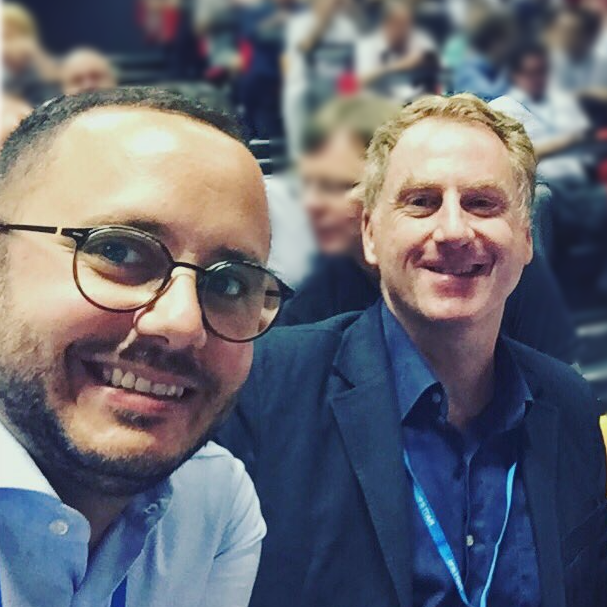 The COVID pandemic has changed the world. Europe is now experiencing several challenges which have significant impacts on the resilience of society and territories. Regional Science can provide valuable answers.
The COVID pandemic has changed the world. Europe is now experiencing several challenges which have significant impacts on the resilience of society and territories. Regional Science can provide valuable answers.
The 60th edition of ERSA Annual Congress is coming to Bolzano (Italy) from 24 to 27 August, with the umbrella topic Territorial Futures - Visions and scenarios for a resilient Europe.
Our enthusiasm continues with this year's topic providing regional scientists worldwide a unique international platform to come together and share their findings on how best meet the numerous challenges of society today.
We look forward to your proposals!
Thomas Streifeneder & Andrea Omizzolo
Co-chairs of the Local Organising Committee
>Learn more about the Central topic
> Submit your Special Session topic
Contribute to ERSA2021 with a Special Session!
Special Sessions
Bring added value to our ERSA Congress Contribute to making our Congress the largest academic event in Regional Science worldwide.
Are organised in an exciting and fresh format with in-depth discussions, knowledge sharing and best quality of presentations.
Deadline for Proposals: January 10, 2021
Follow us and join the conversation #ERSA2021
Organisers and Partners


The 60th Annual Meeting is now VIRTUAL!!!
This is an important announcement for the WRSA's 60th Anniversary Meeting in February 2021. Due to the growing uncertainty with the recent resurge of COVID-19 worldwide, it is challenging to have our in-person meeting in Palm Springs as scheduled.
WRSA reached an agreement to cancel the in-person meeting in Palm Springs and to move forward with the VIRTUAL MEETING option.
WRSA understands that the virtual meeting is not the most ideal for scholarly interaction among our members and participants; however, protecting the health of our members is our highest priority. Thank you for your understanding!
So now, WRSA 2021 will be virtual.
Here are some key updates.
- Meeting Date Changed:
- The new meeting dates will be Monday, Feb 22 - Thursday, Feb 25, 2021 (instead of Feb 21 - 24, 2021).
- The WRSA 2021 Virtual Meeting will open on Monday, February 22nd with the Lay James Gibson Opening Plenary Session. Three days of paper sessions and some virtual social events will follow on Tuesday, Wednesday, and Thursday (the 23rd through the 25th).
- New Paper Submission Due Date:
- The new extended paper submission due date is Dec 31st, 2020.
- This also applies to the Tiebout Prize Paper Competition submission.
- Registration Fee Adjusted:
The registration fee for the 60th Anniversary Virtual Meeting has been changed.- For Regular (non-student) Participants, the new registration fee is $95, which includes the WRSA's Annual Membership Due. For those not participating in the annual conference, the Annual Membership Due is $95.
- For Student Participants, the new registration fee is $40. The registration fee for the students who submit their papers to the Tiebout Prize Paper Competition will be waived.
- Tiebout Prize:
- Tiebout Prize Paper Competition submission due is also extended to Dec 31st, 2020.
- The registration fee for the students who submit their papers to the Tiebout Prize Paper Competition will be waived.
Please login to the User Area of the WRSA Website (https://www.wrsaonline.org/newsite/) to submit your paper and encourage your colleagues to participate in our 60th Anniversary meeting to be held virtually on February 22-25, 2021.
Also, feel free to contact me at This email address is being protected from spambots. You need JavaScript enabled to view it. if you have any questions or concerns.
Peter Nijkamp has received the Roger R. Stough Outstanding Mentor Award
Peter Nijkamp has received the prestigious Roger R. Stough Outstanding Mentor Award, at the recent conference of the North American Regional Science Association (NARSC). We all congratulate Peter on this important milestone.
Roger R. Stough Outstanding Mentor Award
This award is named in honor of Professor Roger R. Stough. In addition to being a renowned scholar and contributor to the development of Regional Science, Roger was an outstanding mentor to dozens of graduate students and junior faculty members. This award recognizes regional scientists who have been exceptional mentors to students, junior faculty members and underrepresented populations and communities over a lifelong career.
2020 Peter Nijkamp
Two open planning positions at UNC Charlotte (Charlotte, NC, USA)

Department of Geography and Earth Sciences
9201 University City Boulevard, Charlotte, NC 28223-0001
Phone: 704-687-5973
Position Number 6899 - Assistant Professor in Environmental Planning
Position Number 6908 - Assistant Professor in Urban and Community Planning
Department of Geography and Earth Sciences University of North Carolina at Charlotte
The Department of Geography and Earth Sciences and the College of Liberal Arts and Sciences at the University of North Carolina at Charlotte invite applications for two tenure-track appointments at the rank of Assistant Professor. In an effort to bridge urban and environmental strengths across the Department and in support of a social justice initiative across the College of Liberal Arts and Sciences, these positions contribute to our Department’s urban planning programs. Both positions will begin on August 12, 2021.
The first position is in the area of Environmental Planning. We are seeking a dynamic and broadly trained scholar with expertise in areas such as environmental justice, environmental governance, environmental assessment, lifecycle assessment, low-carbon lifestyles, climate change adaptation, resilience, socio-ecological systems, and/or urban sustainability. We welcome candidates who have an urban focus and who will complement one or more methodological areas of expertise in the Department. Preference will be given to candidates whose work involves the use of both quantitative and qualitative methods (e.g., mixed methods) as well as geospatial approaches, and examines planning issues through an equity lens using a community engagement component. We would be excited to see applications from candidates who use innovative approaches in their research, including but not limited to research co-design, citizen science, and experimental survey design.
The second position is in the area of Urban and Community Planning. We are seeking a dynamic and broadly trained planner with expertise in the built environment, urban development, social justice, community resilience, human-environment relationships, and/or socio-ecological systems. Geographic and topical areas of research are open, with preference given to individuals who will complement one or more methodological áreas of expertise in our department such as community-engaged action research, community mapping, mixed-methods, and/or qualitative methods.
Requirements for these positions include a PhD in Geography, Planning, or a related field in hand by the time of appointment, evidence of scholarly productivity, an ability to secure appropriate external funding, and the potential for engaging students in a diverse academic environment. The candidate should also show evidence of interdisciplinary collaboration and attention to equity issues in their teaching and research.
Candidates should demonstrate the ability to contribute to the department’s undergraduate and graduate curriculum, build a successful, cutting-edge research program, and develop coursework in their area of expertise. The department is particularly interested in candidates who have experience working with students from diverse backgrounds and demonstrated commitment to improving access to higher education for all students, along with an interest in promoting diversity in their research, teaching, and service. The teaching load for new faculty is two courses per semester in the pre-tenure period.
The Department of Geography and Earth Sciences (http://www.geoearth.uncc.edu/) is a diverse community of 33 social and physical scientists, nearly 700 undergraduate majors, and 90 graduate students from a variety of disciplinary backgrounds. The Department’s mission is to create and disseminate scientific knowledge about the social and natural systems of the Earth and their interactions through scholarly research, teaching, and service. The Department is committed to rigorous high-level research and excellence in teaching. The Department offers undergraduate degrees in Geography (BA/BS), Earth and Environmental Sciences (BS), Geology (BS), Environmental Studies (BA), and Meteorology (BS). At the graduate level, the Department offers an MA and a PhD in Geography, an MS in Earth Sciences, and a graduate certificate in Geographic Information Science & Technology. In addition, the department is a core participant in several interdisciplinary graduate programs on campus, including PhD programs in Public Policy (PPOL) and Infrastructure and Environmental Systems (INES), and the Master’s in Urban Design (MUD).
UNC Charlotte is a rapidly growing doctoral-granting urban university located in the largest metropolitan area between Washington, DC and Atlanta. The University is a Carnegie Foundation Community Engagement campus. Over 30,000 culturally diverse students are enrolled at the University. As the largest college at UNC Charlotte, the College of Liberal Arts and Sciences houses 20 departments in the humanities, social and behavioral sciences, natural sciences, and military sciences, as well as 25 applied research centers and interdisciplinary programs. It offers eight doctoral degrees, 24 master's degrees, 12 graduate certificates, and 32 undergraduate degrees.
Candidates should submit the following to https://jobs.uncc.edu [Environmental Planning Position Number 6899; Community and Urban Planning Position Number 6908]: (1) a letter of application responding to the required and desired qualifications listed above, including a diversity, equity, and inclusion statement; (2) a statement of current and future research; (3) a teaching statement including teaching philosophy, agenda, and evidence of teaching effectiveness; (4) a curriculum vitae; (5) one to three representative publications; and (6) contact information (including email addresses) for at least three professional references. We ask applicants to reflect on how they integrate issues surrounding diversity into their teaching, research and/or services.
Review of applications will begin on January 4, 2020 and will continue until the position is filled. For more information, contact: Environmental Planning Position- Dr. Isabelle Nilsson (This email address is being protected from spambots. You need JavaScript enabled to view it.) or Dr. Sara Gagné (This email address is being protected from spambots. You need JavaScript enabled to view it.); Community and Urban Planning position – Dr. Elizabeth Delmelle (This email address is being protected from spambots. You need JavaScript enabled to view it.).
As an EOE/AA employer and an ADVANCE Institution that strives to create an academic climate in which the dignity of all individuals is respected and maintained, the University of North Carolina at Charlotte encourages applications from all underrepresented groups. UNC Charlotte is an affirmative action, equal opportunity employer and is committed to achieving excellence through cultural diversity. The university actively encourages applications and/or nominations of women, persons of color, veterans, and persons with disabilities.
The candidate chosen for this position will be required to provide an official transcript of their highest earned degree and submit to a criminal background check.
ERSA-JRC Winter School 2021: Extended Application deadline until 25 November
Call for Application extended until 25 November!
Are you a smart young researcher* looking for state-of-the art knowledge around the topic of #smartspecialisation, willing to present your research and get precious feedback from outstanding professors and experts.
> Don't miss out this last chance > Apply now!
*Doctoral and Postdoctoral students as well as junior researchers with less than 5 years of experience.
Lecturers and Lab Sessions Update
Confirmed lectures:
|
The laboratory Sessions Update will feature:
· Tools and data for Smart Specialisation
· Evidence from S3 implementation and monitoring
· Smart Specialisation for Sustainable Development Goals
>>> Stay tuned: More updates to be posted shortly on the Winter School website
ERSA-JRC Winter School 2021 jointly organised with the Joint Research Centre of the European Commission (Seville) and in partnership with the ERSA Spanish Section AECR

Follow us and join the conversation on #ERSAWinterSchool #smartspecialisation
Mexican Section: 25th AMECIDER Conference, November 17-20, 2020, Online

DEL 17 AL 20 DE NOVIEMBRE DE 2020, CIUDAD DE CHIHUAHUA
UNIVERSIDAD AUTÓNOMA DE CHIHUAHUA, FACULTAD DE CIENCIAS AGROTECNOLÓGICAS

Chairperson - Department of City and Regional Planning
Chairperson - Department of City and Regional Planning
The Department of City and Regional Planning (CRP) in the College of Architecture, Art and Planning at Cornell University invites applications for a dynamic, visionary leader to serve as the Department Chair for a renewable three-year term, to be appointed at the associate or full professor level. Areas of specialization are open. The faculty in CRP are committed to teaching and scholarship that values diversity, equity, social justice, environmental sustainability and furthers these values in the planning, design, and governance of cities.
The next Chairperson will be an internationally known scholar with the ability to be strategic about CRP’s future opportunities, who can build on the record for scholarly and professional excellence that CRP has established since its inception more than 80 years ago. We seek a scholar and administrative leader committed to supporting innovative research and scholarship, engaged learning and community outreach, professional excellence and service, and who is supportive of partnerships and collaborative work both inside and outside the college and university. The qualifications of the candidate should be consistent with a tenured appointment at the level of an associate or full professor, with a Ph.D. in urban planning or a related field.
The Chair is responsible for providing leadership and oversight of the department’s academic programs and budgets and working with the department’s administrative manager to ensure a workplace that is supportive of faculty, staff, and students. In fulfilling these responsibilities, the chair will work in close collaboration with the department faculty and the college dean. The ideal candidate will help create an environment of collaboration, transparency, and shared governance.
CRP is a top-ranked planning department with a full-time faculty of 17. Our faculty ranks among the top in the country for scholarly productivity and influence, with pre-eminence in many areas, including regional development, land-use and environmental dynamics, international development, historic preservation, and urban history. The new chair will lead a Department of City and Regional Planning that draws students from across the U.S. and the world. Our students earn: a Bachelor of Science in the liberal-arts Urban and Regional Studies program; a professional Master of Regional Planning; a Master of Arts in the Historic Preservation Planning Program; a Master in Regional Science; a Masters in the Baker Program in Real Estate; and Ph.D. degrees in City and Regional Planning and Regional Science. While the principal locus of academic and administrative activity is in Ithaca, NY, the Department has innovative study programs in Rome and New York City.
CRP also offers students and faculty exciting research and professional opportunities in collaboration with Cornell’s Atkinson Center for Sustainable Futures, the Einaudi Center for International Studies, Engaged Cornell, Center for the Study of Inequality, and the Public Service Center, among other multi-disciplinary venues. The Chair will play a key role in campus-wide initiatives related to environmental sustainability, international development, data analysis, public policy and the social sciences.
Diversity and inclusion are a part of Cornell University’s heritage. We are a recognized employer and educator valuing AA/EEO, protected veterans, and individuals with disabilities. Cornell is committed to hiring faculty who share its historical commitment to educating and pursuing knowledge for any person in any study. We require that every applicant for an academic appointment provide a Statement of Contribution to Diversity, Equity, and Inclusion. This statement offers candidates an opportunity to describe their potential contributions to diversity and inclusion at Cornell and our legacy of “. . . any person . . . any study.”
Application Process
Interested individuals should submit a letter of interest (that includes a discussion of the candidate’s academic leadership, scholarly and research interests, and teaching experience); curriculum vitae; and Statement of Contribution to Diversity, Equity, and Inclusion using the university’s online application tool: https://academicjobsonline.org/ajo/jobs/17287. Nominations and applications will be reviewed beginning January 15, 2021 and will be accepted until the position is filled. The department chair appointment is expected to begin July 1, 2021. For questions and additional information, please send an email to This email address is being protected from spambots. You need JavaScript enabled to view it..
Diversity and Inclusion are a part of Cornell University’s heritage. We are a recognized employer and educator valuing AA/EEO, Protected Veterans and Individuals with Disabilities. We also recognize a lawful preference in employment practices for Native Americans living on or near Indian reservations. Cornell University is an innovative Ivy League university and a great place to work. Our inclusive community of scholars, students, and staff impart an uncommon sense of larger purpose, and contribute creative ideas to further the university's mission of teaching, discovery, and engagement.
Application Materials Required:
Submit the following items online at this website to complete your application:
- Curriculum Vitae
- Letter of Interest(that includes a discussion of your academic leadership, scholarly and research interests, and teaching experience)
- Statement of Contribution to Diversity, Equity, and Inclusion
And anything else requested in the position description.
Further Info:
https://aap.cornell.edu/academics/crp

607-255-9987
Cornell University
College of Architecture, Art and Planning
106 Sibley Hall
Ithaca, NY 14853
NARSC has just started its congress today (9/10/2020)!

NARSC Virtual Conference, November 9-13, 2020
NARSC Virtual Conference has just started its congress today!
The conference program is available here: NARSC 2020 – Final Program (11/5/2020)
About Us
The Regional Science Association International (RSAI), founded in 1954, is an international community of scholars interested in the regional impacts of national or global processes of economic and social change.



